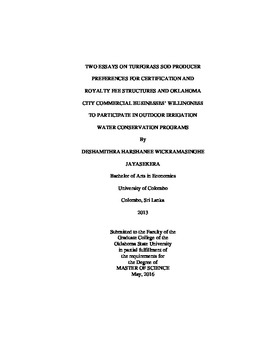| dc.contributor.advisor | Boyer, Tracy A. | |
| dc.contributor.author | Jayasekera, Deshamithra Harshanee Wickramasinghe | |
| dc.date.accessioned | 2017-02-22T22:15:14Z | |
| dc.date.available | 2017-02-22T22:15:14Z | |
| dc.date.issued | 2016-05-01 | |
| dc.identifier.uri | https://hdl.handle.net/11244/49089 | |
| dc.description.abstract | In the first article, we surveyed turfgrass sod producers to determine theirpreferences for different sod cultivars contingent on certain traits and their price.Turfgrass breeders have developed turfgrass cultivars exhibiting traits for improved long term maintenance, appearance, utility, and resistance to abiotic and biotic stressors. Asuniversities seek to capture revenue to cover research costs, these cultivars are typicallyprotected by intellectual property rights. Holders of these rights generally requireproducers to be licensed to produce and sell proprietary cultivars, as well as pay royalties, impacting the marketability of cultivars available for sale. An online turfgrass preference survey with sod producers using a discrete choice experiment was conducted in Spring 2015. The design incorporated attributes such as cultivar, certification agency, fee structure, maintenance reduction potential, and price per square foot. Results from the analysis indicated that producers preferred genetically modified breeds and fee structures that allow producers to share the market uncertainty with the breed developers. In the second article, we dealt with understanding outdoor irrigation water conservationin the commercial sector. Periodic drought stress in Oklahoma has forced utilitiesdepartments, including Oklahoma City, to seek ways of conserving water in both theresidential and non-residential sectors. Most of these efforts largely targeted theresidential sector. In this study, we identified the willingness of commercial businesses inthe Oklahoma City metro area to participate in water conservation methods such asinstalling soil moisture sensors, smart irrigation controllers for their businesses andparticipating in voluntary irrigation assessments. We conducted a mail survey of 2784Oklahoma City Water Utilities� commercial customers in which we used data fromcontingent valuation questions to elicit the financial savings on water that wouldencourage participation in a landscape irrigation assessment or adoption of smartirrigation controllers. A sub sample experimental group received detailed informationabout future block rate water price increases. The results of the study indicated that, atcurrent water utilities price rates commercial businesses are unlikely to adopt theseprograms, but that including information about future price rate hikes may induce asubset of businesses to participate. | |
| dc.format | application/pdf | |
| dc.language | en_US | |
| dc.rights | Copyright is held by the author who has granted the Oklahoma State University Library the non-exclusive right to share this material in its institutional repository. Contact Digital Library Services at lib-dls@okstate.edu or 405-744-9161 for the permission policy on the use, reproduction or distribution of this material. | |
| dc.title | Two Essays on Turfgrass Sod Producer Preferences for Certification and Royalty Fee Structures and Oklahoma City Commercial Businesses� Willingness to Participate in Outdoor Irrigation Water Conservation Programs | |
| dc.contributor.committeeMember | Chung, Chanjin | |
| dc.contributor.committeeMember | Moss, Justin Q | |
| osu.filename | Jayasekera_okstate_0664M_14607.pdf | |
| osu.accesstype | Open Access | |
| dc.description.department | Agricultural Economics | |
| dc.type.genre | Thesis | |
| dc.type.material | text | |
